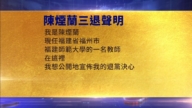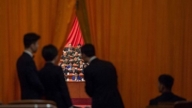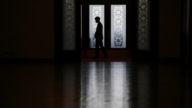【新唐人2013年08月06日讯】大陆政坛重要场合北戴河暑期办公即将展开,中共高层将云集北戴河。台湾《中央社》透露,比照往年,今年的北戴河会议仍将安排观影活动,目前已有4部片子送抵,包括不能在大陆公映的2012年的法国情欲禁片《登堂入室》(Dans la maison)。此外,一些不适合公映或者尚未通过审查的电影,也会被安排进入北戴河观影名单。与中共高层有频繁接触的大陆学者指出,观看禁片一向是中共领导人的特权。
《中央社》引述知情人士的话透露,《登堂入室》(Dans la maison)未在大陆公开上映,仅在7月间,中共国家新闻出版广电总局下属的中国电影资料馆曾以学术观摩名义放映过。该片围绕一对师生的作文讲习展开故事,外间评价说,“导演巧妙拼接偷窥文学与扑朔迷离的现实断面,用似真似幻、充满层次感的创作故事挑战情欲道德禁区”。
《登堂入室》还充斥了大量中国元素:画廊内中国艺术家创作的上海的天空﹔剧中角色中国热情、中国客户、中国产品乃至中国发财梦。 而电影出现对毛泽东、斯大林、希特勒的模仿,据信是电影永远不会在大陆上映的原因。
中国作家、中共元帅叶剑英的养女戴晴指出,按照《宪法》第35条,思想言论、公民自由都是受到保护的。她还认为,对资讯的了解以及对文化的接受,当局不应该因为一个人级别不同、身份不同而实施不同的透明度。
戴晴:“但是自从1949年以来,他们从来都是这样做的。在文革的时候,简直全中国的人,大家只能看八个样板戏。江青她可以调任何所有的片子,就是因为各种片子都是从电影资料库里面走。所以她想调什么就调什么。从来他们都是这样,没有什么变化。”
原国务院农村发展研究中心研究员姚监复说,在中共统治的历史上电影分两类,一类是领导人看的、一类是给老百姓看的。姚监复曾经担任前中共总书记赵紫阳的智囊。
姚监复:“所以江青在文化大革命的时候可以看很多电影,她可以找她认为信得过的人看。政治性的,艺术性的,甚至色情的,她都可以看。他们希望知己知彼,也知道历史。所以从江青,从毛泽东开始就看禁片。他们不能让群众看,但是他们自己看。”
《中央社》还报导说,一些不适合公映或者尚未通过审查的电影,也会被安排进入北戴河观影名单。1987年的北戴河会议期间,未公演的《芙蓉镇》便放映给时任中共总书记的赵紫阳观看。
姚监复向《新唐人》透露赵紫阳观看《芙蓉镇》的情形。
姚监复:“给赵紫阳看的时候,赵紫阳看完站起来就要走,结果请他看电影的负责审查电影的这些部门的人说,紫阳同志,你还没提意见呢,赵紫阳说:电影,如果要我们审查批准,我以后就不来看了。所以从《芙蓉镇》以后,在赵紫阳当政的时候没有审查过一部电影。这是鲍彤跟我说的。”
姚监复分析,如果北戴河会议的确将要召开的话,那么是为三中全会做准备。他指出,三中全会在中共历史上历来是很重要的会议。一中全会是确定共产党的领导人选,二中全会是确定人大和政府的领导人选。三中全会是确定改革日程。但是姚监复认为,中共这一次不会谈牵涉到一党专政的政治体制改革,而只会谈论经济改革。
姚监复:“中国(共)现在不可能进行政治体制改革,如果进行一党专政的改革,你不是要把共产党赶下台吗?中共领导人没有蒋经国的思想深度,就是永远没有一个党能够永远执政的,古今中外历史没有。蒋经国认识到这一点。共产党是(希望)中国共产党万岁,是要永久执政的合法性。”
姚监复表示,七不讲也好、九号文件也好、四项原则也好、六项标准也好、两个凡是也好,都是为了中共自己一党专政的合法性。他说,赵紫阳表达过这样的观点:永久执政的理念不改变,就不是政治改革。
采访编辑/秦雪 后制/李月
Erotic Film for CCP Officials During Beidaihe Gathering
High-level officials in the Chinese Communist Party
(CCP) will gather in Beidaihe, in their summer office.
According to Taiwan’s Central News Agency,
as in previous years,
this Beidaihe meeting will also arrange movies
for viewing, and four films had been delivered.
This includes the prohibited 2012 film
Dans la Maison, a banned French erotic film.
In addition, other films deemed unsuitable for release,
or uncensored films, will also be arranged for Beidaihe.
Chinese scholars who have frequent contacts
with high-level CCP officials have highlighted
watching banned films has always been
a prerogative of the CCP leaders.
Central News Agency quoted informants that
Dans la Maison is not publicly released in China.
The film is only screened in the name of academic
consideration at the China Film Archive Building, under
the State Press and Publication Administration of Radio.
The film is about a writing workshop
between a teacher and a student.
Critics said, “the director cleverly splices
voyeur literature with confusing sections.
It challenges restricted moral areas
with real magical, layered stories.”
The film has many references to China. The
Chinese artists have “Shanghai Sky" in the gallery.
It also includes enthusiasm for China, Chinese
customers, Chinese products, and even
represented the Chinese dream of getting rich.
The film representations of Mao, Stalin, and
Hitler, which is believed to be the reason why
“the movie will never be released in China”.
Chinese writer Dai Qing, the adopted daughter
of CCP Marshal Ye Jianying spoke about this issue.
In accordance with Article 35 of the Constitution,
thought, speech, and civil liberties are all protected.
She also believes that her understanding of
information, and acceptance of culture, should
not have different transparency due to peoples
different levels and different identities.
Dai Qing: “Since 1949, they have always been doing so.
During the Cultural Revolution, almost all people
in China can only watch eight model operas.
Jiang Qing can see any film, because a
variety of films are from the movie database.
So they could see whichever movie they wanted.
It had always been like this, and nothing changed.”
Yao Jianfu, a former researcher of the Research
Center of State Rural Development commented.
In the history of the CCP, there were two types of movies.
One type is for the leaders, and
the other type is for the people.
Yao Jianfu served as a think tank of the
former CCP General Secretary Zhao Ziyang.
Yao Jianfu: “So Jiang Qing could watch
many movies during the Cultural Revolution,
and could watch with her trusted ones.
She could watch political, artistic, and even erotic
movies. They wanted to know about this, and of history.
So Jiang Qing and Mao Zedong began to see banned films.
They did not let people to watch, but they watched them.”
The Central News Agency also reported that some
movies are unsuitable for public release or uncensored.
These will also be arranged into Beidaihe movie list.
In 1987, in the Beidaihe meeting, “Hibiscus Town”,
which is not released to the public, was provided
to the former CCP General Secretary Zhao Ziyang.
Yao Jianfu revealed this situation to NTD Television,
about when Zhao Ziyang watched Hibiscus Town.
Yao Jianfu: “When it was shown to Zhao Ziyang,
Zhao stood up to leave after watching it.
But the person in charge of movie censorship
asked him to give some comments on the film.
Zhao said that if you wanted us to review and approve
movies, then I would not come to see it any more.
So after Hibiscus Town, when Zhao Ziyang
was in power, he did not review any movie.
This is what Bao Tong told me.”
Yao Jianfu analyzed that if the Beidaihe
meeting would be held for certain, then it is
a preparation for the Third Plenary Session.
He pointed out that the Third Plenary Session of
the CCP has always been a very important meeting.
The first plenary session is to determine
the candidates of the CCP leaders.
The Second Plenary Session determines candidates
of the National People’s Congress and government.
The Third Plenary session is
to determine the reform agenda.
Yao Jianfu believed that the CCP would not talk
about one-party dictatorship and political reform.
It will only talk about economic reforms.
Yao Jianfu: “It is now impossible
to have political reform in China.
If it carried out the reform of the one-party dictatorship,
and then isn’t it removing the CCP from power?
The CCP leaders did not have the
depth of thought of Mr. Jiang Jingguo.
That is, a party does not rule forever, it has been
so from ancient times until now. Jiang realized this.
The CCP hopes a long live for itself, and
the permanent legitimacy of the ruling party.”
Yao Jianfu said that no matter the seven things not
to speak about, or Number 9 document, or the four
principles, or six criteria, or two whatevers, they have
all served for the legitimacy of one-party dictatorship.
He said Zhao expressed this view, that if the idea of
permanent rule did not change, it was not political reform.





























